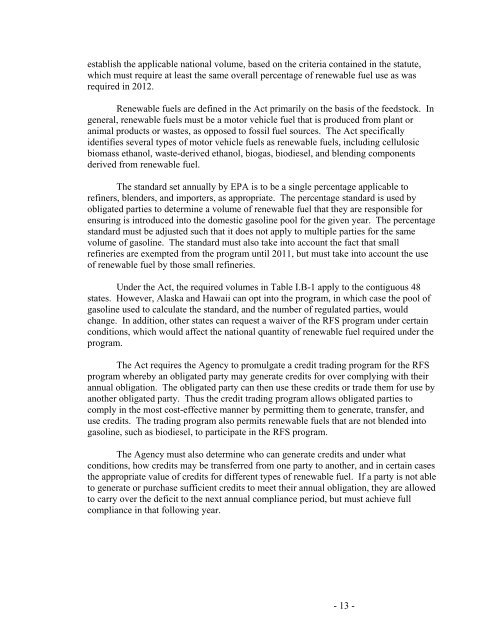Regulation of Fuels and Fuel Additives: Renewable Fuel Standard ...
Regulation of Fuels and Fuel Additives: Renewable Fuel Standard ...
Regulation of Fuels and Fuel Additives: Renewable Fuel Standard ...
Create successful ePaper yourself
Turn your PDF publications into a flip-book with our unique Google optimized e-Paper software.
establish the applicable national volume, based on the criteria contained in the statute,<br />
which must require at least the same overall percentage <strong>of</strong> renewable fuel use as was<br />
required in 2012.<br />
<strong>Renewable</strong> fuels are defined in the Act primarily on the basis <strong>of</strong> the feedstock. In<br />
general, renewable fuels must be a motor vehicle fuel that is produced from plant or<br />
animal products or wastes, as opposed to fossil fuel sources. The Act specifically<br />
identifies several types <strong>of</strong> motor vehicle fuels as renewable fuels, including cellulosic<br />
biomass ethanol, waste-derived ethanol, biogas, biodiesel, <strong>and</strong> blending components<br />
derived from renewable fuel.<br />
The st<strong>and</strong>ard set annually by EPA is to be a single percentage applicable to<br />
refiners, blenders, <strong>and</strong> importers, as appropriate. The percentage st<strong>and</strong>ard is used by<br />
obligated parties to determine a volume <strong>of</strong> renewable fuel that they are responsible for<br />
ensuring is introduced into the domestic gasoline pool for the given year. The percentage<br />
st<strong>and</strong>ard must be adjusted such that it does not apply to multiple parties for the same<br />
volume <strong>of</strong> gasoline. The st<strong>and</strong>ard must also take into account the fact that small<br />
refineries are exempted from the program until 2011, but must take into account the use<br />
<strong>of</strong> renewable fuel by those small refineries.<br />
Under the Act, the required volumes in Table I.B-1 apply to the contiguous 48<br />
states. However, Alaska <strong>and</strong> Hawaii can opt into the program, in which case the pool <strong>of</strong><br />
gasoline used to calculate the st<strong>and</strong>ard, <strong>and</strong> the number <strong>of</strong> regulated parties, would<br />
change. In addition, other states can request a waiver <strong>of</strong> the RFS program under certain<br />
conditions, which would affect the national quantity <strong>of</strong> renewable fuel required under the<br />
program.<br />
The Act requires the Agency to promulgate a credit trading program for the RFS<br />
program whereby an obligated party may generate credits for over complying with their<br />
annual obligation. The obligated party can then use these credits or trade them for use by<br />
another obligated party. Thus the credit trading program allows obligated parties to<br />
comply in the most cost-effective manner by permitting them to generate, transfer, <strong>and</strong><br />
use credits. The trading program also permits renewable fuels that are not blended into<br />
gasoline, such as biodiesel, to participate in the RFS program.<br />
The Agency must also determine who can generate credits <strong>and</strong> under what<br />
conditions, how credits may be transferred from one party to another, <strong>and</strong> in certain cases<br />
the appropriate value <strong>of</strong> credits for different types <strong>of</strong> renewable fuel. If a party is not able<br />
to generate or purchase sufficient credits to meet their annual obligation, they are allowed<br />
to carry over the deficit to the next annual compliance period, but must achieve full<br />
compliance in that following year.<br />
- 13 -
















